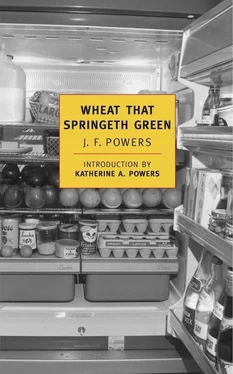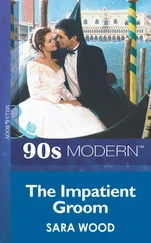J. Powers - Wheat That Springeth Green
Здесь есть возможность читать онлайн «J. Powers - Wheat That Springeth Green» весь текст электронной книги совершенно бесплатно (целиком полную версию без сокращений). В некоторых случаях можно слушать аудио, скачать через торрент в формате fb2 и присутствует краткое содержание. Год выпуска: 2000, Издательство: NYRB Classics, Жанр: Современная проза, на английском языке. Описание произведения, (предисловие) а так же отзывы посетителей доступны на портале библиотеки ЛибКат.
- Название:Wheat That Springeth Green
- Автор:
- Издательство:NYRB Classics
- Жанр:
- Год:2000
- ISBN:нет данных
- Рейтинг книги:5 / 5. Голосов: 1
-
Избранное:Добавить в избранное
- Отзывы:
-
Ваша оценка:
- 100
- 1
- 2
- 3
- 4
- 5
Wheat That Springeth Green: краткое содержание, описание и аннотация
Предлагаем к чтению аннотацию, описание, краткое содержание или предисловие (зависит от того, что написал сам автор книги «Wheat That Springeth Green»). Если вы не нашли необходимую информацию о книге — напишите в комментариях, мы постараемся отыскать её.
Wheat That Springeth Green — читать онлайн бесплатно полную книгу (весь текст) целиком
Ниже представлен текст книги, разбитый по страницам. Система сохранения места последней прочитанной страницы, позволяет с удобством читать онлайн бесплатно книгу «Wheat That Springeth Green», без необходимости каждый раз заново искать на чём Вы остановились. Поставьте закладку, и сможете в любой момент перейти на страницу, на которой закончили чтение.
Интервал:
Закладка:
“About what?”
“Anything. The office area. Weren’t you surprised when you saw it?”
“No. I mean I’d heard about it.”
Joe sniffed, assuming the worst. “There’s been a lot of talk. Most of it pro, but some of it con. You know the clergy. Or maybe you don’t. They come out here and sneer at the office area, laugh at my bathroom — it’s orange and black tile, bright orange, an architect’s error.” Joe shook his head. “I’ve taken a lot, and not just from the clergy. ‘Father, when will you build God a nice house?’ One of the nuns — thank God they’re gone for the summer.” (What the nun had actually said was, “Father, when will you build God a nice house like yours ?” to which he’d swiftly replied, “And like yours , Sister?”) “But most of the negative comment comes from the clergy — from guys who wish they’d built the rectory first and now are afraid they’ll never get it. It’s not easy to sell people on a rectory after you’ve sold them on a church, especially if they’re still paying for the church, especially if there’s already a rectory of sorts. Fortunately, there wasn’t one here, just the beginnings of one, a basement, where my predecessor lived, and I built the convent there. Fortunately, I say, because the rectory would’ve been like the church — on the small side, wartime construction, nothing like this. These guys”—coming back to his critics, and in case the curate was one—“like to forget I spent a year in a trailer and lived in a room in the school. And God’ll get a new house, God willing. Just waiting until the time is ripe, saving the best wine till last.” (This didn’t, as it had the Arch and his reverend consultors, move the curate visibly.) “What I don’t like about waiting, apart from the overcrowding at the late Masses on Sunday, is the way construction costs keep rising. And as I see it, money’s going to get tighter. Don’t suppose you know much about that — money.”
“No. Not much.”
“Well, you’ll be glad to hear we don’t talk about it here — in church. We just present the bill for services rendered, like doctors and lawyers.” Joe explained his fiscal system. “Actually, it’s just the old pew-rent system updated, with the option of time payments — something people today understand. I had the Sunday-envelope system, but they were killing me with their vacations. Summer and winter. In the history of the world there’s never been a time like this for travel — everybody and his brother. With my overhead, I had to do something.”
“Five hundred seems a lot.”
“In most cases, in a parish like this, it’s not three percent of the family income. The Mormons, I understand, get ten.”
“Still seems a lot.”
“It’s not for every parish. Ideally, it should only be tried in new parishes, so you don’t have the troublesome changeover period.” Joe hadn’t passed through that period yet.
“Still seems a lot.”
Hey, whose side you on? “The old nickel-and-dime days are over, Father, but if it’ll make you feel any better I’ll handle that part for the time being.”
“Thanks.”
Joe got up, went to the desk, on which a light snow of paper had fallen since the curate’s first visit, and dipping into it, selected an unimportant letter. “Answer this one right away, will you? I’ve made a note on the margin so you’ll know what to say. Keep it brief. Sign your name — Assistant Pastor. Better let me have a look at it before you seal it.” So the curate could get on with it, Joe headed back to his office.
“Does it have to be typed ?”
Joe pulled up short. “How’s that?”
“Can’t type it.”
“What d’ya mean?”
“Can’t type .”
Joe stood there in a distressed state. “Can’t type,” he said to himself, and then to the curate, “You mean at the sem you did everything in longhand? Term papers and everything?”
The curate, who seemed to think that too much was being made of his disability, nodded.
“Hard to believe,” Joe said. “Why, you must’ve been the only guy in your class not to use a typewriter.”
“There was one other guy.”
Joe was relieved — at least the gambler in him was — to know that he hadn’t been quite as unlucky as he’d supposed. “But you must’ve heard guys all around you using typewriters. Didn’t you ever wonder why?”
“I never owned a typewriter. Never saw the need.” The curate sounded proud, like somebody who brushes his teeth with table salt. “I write a good, clear hand.”
Joe snorted. “ I write a good, clear hand. But I don’t do my parish correspondence by hand. And I hope you won’t when you’re a pastor.”
“The hell with it, then.”
Joe, who had been walking around in a distressed state, stopped and looked at the curate, but the curate — pretty clever — wouldn’t look back. He was getting out a cigarette. Joe shook his head, and walked around shaking it. “Father, Father,” he said.
“Father, hell,” said the curate, emitting smoke. “You should’ve put in for a stenographer, not a priest.”
Joe stopped, stood still, and sniffed. “Great,” he said, nodding. “Sounds great, Father. But what does it mean ? Does it mean you expect me to do the lion’s share of the donkey work around here? While you’re out saving souls? Or sitting in your room, waiting for something to turn up? Does it mean when you’re a pastor you’ll expect your curate to do what you never had to do? I hope not, Father. Because, you know, Father, when you’re a pastor it may be years before you have a curate. You may never have one, Father. You may end up in a one-horse parish. Lots of guys do. You won’t be able to afford a secretary, or public stenographers, and you won’t care to trust your correspondence to nuns, to parishioners. You’ll never be your own man. You’ll always be an embarrassment to yourself and others. Let’s face it, Father. Today, a man who can’t use a typewriter is as ill-equipped for parish life as a man who can’t drive a car. Go ahead. Laugh. Sneer. But it’s true. You don’t want to be like Toohey, do you? He can’t type, and he’s set this diocese back a hundred years. He writes ‘No can do’ on everything and returns it to the sender. For official business he uses scratch paper compliments of the Universal Portland Cement Company.”
Depressed by the thought of Toohey and annoyed by the curate’s cool, if that was what it was, Joe retired to his office. He sat down at his desk and made a list. Presently, he appeared in the doorway between the offices, wearing his hat. “And, Father,” he continued, “when you’re a pastor, what if you get a curate like yourself? Think it over. I have to go out now. Mind the store.”
Joe drove to the city and bought a typing course consisting of a manual and phonograph records, and he also bought the bed — it was still there — the double, with pineapples. He was told that if he ever wished to order a matching chest or dresser there would be no trouble at all, and that the bed, along with box spring and mattress, would be on the Thursday delivery to Inglenook.
“O.K., Father?”
“O.K., Earl.”
And that afternoon Joe, in his office, had a phone call from Mrs Fox. She just wondered if everything was O.K., she said — as if she didn’t know. She was still dying to see the room. “What’s it like !” Joe said he thought the room had turned out pretty well, thanked Mrs Fox for helping him, and also for calling, and hung up.
Immediately, the phone rang again. “St Francis,” Joe said.
“Bill there?”
Читать дальшеИнтервал:
Закладка:
Похожие книги на «Wheat That Springeth Green»
Представляем Вашему вниманию похожие книги на «Wheat That Springeth Green» списком для выбора. Мы отобрали схожую по названию и смыслу литературу в надежде предоставить читателям больше вариантов отыскать новые, интересные, ещё непрочитанные произведения.
Обсуждение, отзывы о книге «Wheat That Springeth Green» и просто собственные мнения читателей. Оставьте ваши комментарии, напишите, что Вы думаете о произведении, его смысле или главных героях. Укажите что конкретно понравилось, а что нет, и почему Вы так считаете.












